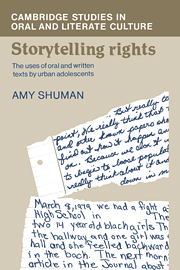Book contents
- Frontmatter
- Contents
- Acknowledgments
- Introduction
- 1 Fight stories: what counts is the recounting
- 2 Storyability and tellability
- 3 Collaborative uses of literacy in the adolescent community
- 4 Retellings
- 5 Varieties of contextuality
- 6 Familiarity and distance: toward a theory of oral and written personal narration
- Notes
- Bibliography
- Index
1 - Fight stories: what counts is the recounting
Published online by Cambridge University Press: 05 November 2011
- Frontmatter
- Contents
- Acknowledgments
- Introduction
- 1 Fight stories: what counts is the recounting
- 2 Storyability and tellability
- 3 Collaborative uses of literacy in the adolescent community
- 4 Retellings
- 5 Varieties of contextuality
- 6 Familiarity and distance: toward a theory of oral and written personal narration
- Notes
- Bibliography
- Index
Summary
Relationships between narrative and experience
Stories categorize experience. The relationship between stories and experience is always problematic and can be stated in many ways. Most generally, it is a relationship between reality and the representation or appearance of reality, or between signifier and signified, or between language and action, or between art and life. The notion of a relationship between stories and experience should be understood as only one of many ways of stating the problem.
Stories, experiences, and events are different entities. Roughly, experiences are the stream of overlapping activities that make up everyday life. Events, unlike experiences, have potentially identifiable beginnings and endings. Events are a category of experience; stories are constructions of experience. Stories frame experiences as events. Stories are one of the forms that transform experiences into bounded units with beginnings, endings, and foci, and events are one kind of bounded unit. A story is the representation of an event segmented into sequentially arranged units.
There has been a tendency in narrative scholarship to assign experience a sense of objectivity so that experience becomes invested with reality, in contrast to stories, which are supposedly understood subjectively. This unfortunate tendency has led scholars to confuse events with experiences, as though one could experience an event. Events are ways of categorizing experience; in a sense, the category “event” makes experiences accessible to understanding by providing a language for talking about experience.
- Type
- Chapter
- Information
- Storytelling RightsThe Uses of Oral and Written Texts by Urban Adolescents, pp. 20 - 53Publisher: Cambridge University PressPrint publication year: 1986

